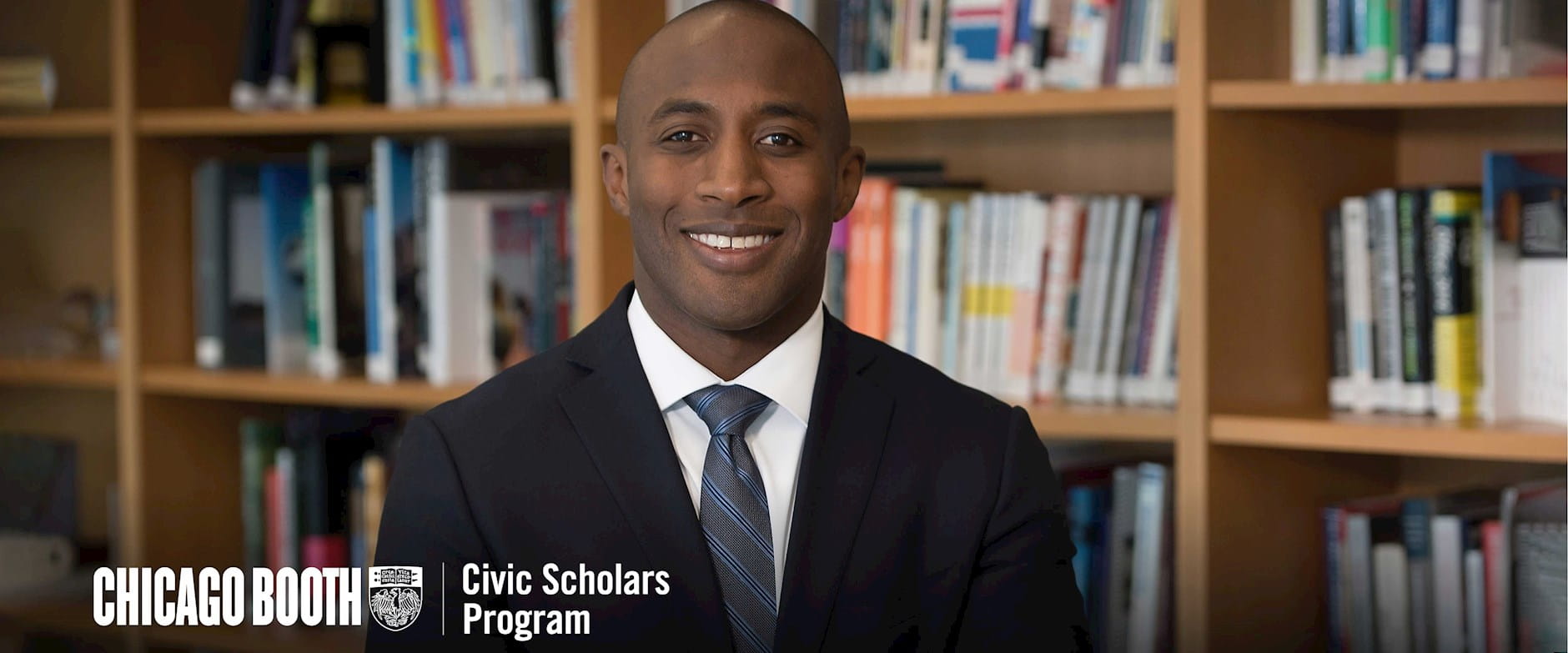The tension is familiar. The business skills and networks that an elite MBA program provide can be invaluable to accelerating innovation, change and impact in the nonprofit sector. Yet, the cost can seem prohibitive. For Jason Quiara, who has devoted his career to expanding educational and economic opportunities for children and families, the answer was Chicago Booth’s Civic Scholars Program. The program provides up to 100% full-tuition support for mid-career MBA candidates committed to the nonprofit or government sector. Quiara, chief strategy officer for a national education nonprofit, discusses the value of an MBA, the importance of the Civic Scholars Program, and the lessons he’s already applying from his Chicago Booth education.
An MBA at the Intersection of Business Education and Civic Leadership
I love strategy. But, it was neither by design – nor strategy – that I launched into business school two years ago. I only recently paid off my student loans from earlier studies. I will graduate this fall from Chicago Booth with a concentration in strategic management.
My current title at work? You guessed it: Chief Strategy Officer at the Berkeley, CA-based nonprofit ConnectED: The National Center for College and Career. We partner with schools, districts, and community leaders to inspire all students, regardless of background, to succeed in college, career, and civic life.
B-School and the Social Sector – “Opportunity to Grow and Effect Change”
“Beautiful but complex” is the shorthand that I use to describe the social sector. Beautiful conveys the incredible commitment of civic leaders and nonprofit professionals who work diligently to tackle society’s most pervasive challenges. Complex connotes the magnitude of both the problems and solutions.
Throughout my career, I worked in early childhood, public education, and workforce systems to support children and families who are furthest from opportunity – especially in communities of color. My commitment to these issues is steadfast, which is why I felt compelled to look for new opportunities to grow and effect change.
I have forged partnerships between public institutions (e.g., school districts and colleges) and private businesses. I’ve always been impressed with the business acumen of workforce leaders in these partnerships, and I coveted these skills and knowledge. My decision to apply to business school was born out of a desire to learn new skills and acquire tools to solve complex problems in society.
The Opportunity
The Civic Scholars Program sits seamlessly at the intersection of business education and civic leadership, ideal for professionals who seek change in the nonprofit sector or government. With costs to attend elite MBA programs out of reach for many of us in the social sector, I couldn’t have attended Chicago Booth without the program’s significant scholarship, made possible by the Neubauer Family Foundation. For young professionals who want to complete a business education but lack the means to pursue this path, becoming a Neubauer Civic Scholar changes the game!
The program’s blend of academic rigor, real-world application, and social activism is ideal for MBA students who are curious and focused on impact. With the support of expert Booth faculty, the program introduced me to new dimensions of social sector innovation and entrepreneurship. These concepts were reinforced with hands-on learning and events to support students’ career development and professional growth through Booth’s Rustandy Center for Social Sector Innovation, the business school’s hub for social impact.
The academic experience at Booth is designed to fit students both where they enter upon arrival and where they want to go upon graduation. The flexibility to learn at your own pace is important – especially for part-time students balancing the demands of the workplace and classroom.
From the Classroom to the Job
Nearly two years into my role at ConnectedED, I’m applying tools from the classroom and the private sector to solve challenges in the public sector. Courses in entrepreneurial selling and business negotiations inform strategies for fundraising, sales, and client development. Recently, I adapted the frameworks from two strategy courses to conduct an industry analysis of the education sector. With that, I developed a business strategy to expand ConnectED’s services nationally. ConnectED works with school districts to ensure high school students, especially students of color, get a head start on college and career through experiences such as internships, project-based learning, STEM education, and advanced college-level coursework. Every day, I’m applying insights from behavioral science to improve relationships in the workplace, manage teams, and strengthen the organizational culture.
Last year, I tapped into lessons from two courses – Diversity in Organizations and Managing the Workplace – to create a Diversity, Equity, and Inclusion Commitment to Action. This commitment summarizes ConnectED’s perspective on why diversity, equity, and inclusion are core to our work and how we intend to deepen our commitment through action. As a next step, I am working with colleagues to implement best practices from these courses and improve equity and inclusion at ConnectED.
Final Reflections: A New Lens
Participation in Chicago Booth’s MBA program helped me grow as a leader and pushed me to new intellectual heights that will ultimately benefit the communities I work to support. Over the last two years, I learned to look upon complex social challenges through a different lens. Lessons from the classroom accrued into new intellectual and interdisciplinary muscles that I intend to flex throughout the rest of my career.
I am ever grateful for the experiences and opportunities created for Neubauer Civic Scholars. I am a stronger, more capable professional than when I arrived. Amid an enduring pandemic and a world that continues to contort in unprecedented directions – I am prepared.
Learn more about Chicago Booth Civic Scholars and apply here.


